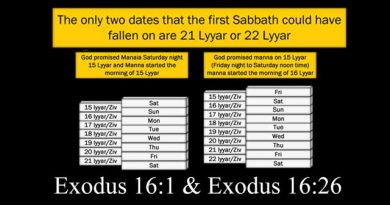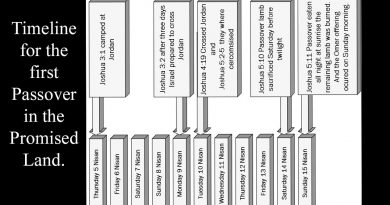King Zedekiah’s Jubilee Triangulation
A triangulation data point for the Exodus date is a Jubilee that occurred within King Zedekiah’s reign. This section will evaluate when the Jubilee occurred and compile a list of potential Exodus years that line up with King Zedekiah’s Jubilee.
The Jubilee cycle started after the division of the Promised Land to the Tribes of Israel and occurred every forty-nine years. The first Jubilee cycle started when Joshua divided the land on the Day of Atonement and then reoccurred every forty-nine years. The Jubilee starts on the tenth day of the tenth month (the Day of Atonement). The Jubilee Year, the fiftieth year, is also the first year in the next forty-nine-year cycle. Thus, the Jubilee would follow every forty-nine years, being the fiftieth year and the start of the next forty-nine-year cycle. “And ye shall hallow the fiftieth year, and proclaim liberty throughout the land unto all the inhabitants thereof: it shall be a Jubilee unto you; and ye shall return every man unto his possession, and ye shall return every man unto his family” (Leviticus 25:10). The Jubilee cycles are also referred to as the seven sets of seven years; hence seven times seven is 49 years.
The Prophet Jeremiah emphasized that King Zedekiah did not celebrate the Jubilee by using the critical language in the past tense: “Therefore thus saith Jehovah: Ye have not hearkened unto me, in proclaiming liberty, every man to his brother, and every man to his neighbor: behold, I proclaim unto you a liberty, saith Jehovah, to the sword, to the pestilence, and to the famine; and I will make you to be tossed to and fro among all the kingdoms of the earth” (Jeremiah 34:17). King Zedekiah is accused of not celebrating the Jubilee as seen in the fact that he did not proclaim liberty to the slaves. Jeremiah used the critical statement “proclaiming liberty” which is reserved for the Jubilee as Ellicott’s commentary explains: “The phrase ‘proclaim liberty’ was closely connected with the year of Jubilee, as in Leviticus 25:10 and Isaiah 61:1.”[1] Barnes agrees: “To proclaim liberty unto them – The words are those of the proclamation of the year of Jubilee to the people, whereupon it became their duty to set their slaves free.”[2] This indicates the Jubilee occurred before (Jeremiah 34:17).
King Zedekiah refused to celebrate the Jubilee before the three-year siege by the Babylonians. King Zedekiah ruled Israel for 11 years, and the last three years were under siege. The return of the Babylonians resulted in the destruction of Jerusalem. Based on that, King Zedekiah’s skipping of the Jubilee had to have occurred before the return of the Babylonians: “Behold, I will command, saith Jehovah, and cause them to return to this city; and they shall fight against it, and take it, and burn it with fire: and I will make the cities of Judah a desolation, without an inhabitant” (Jeremiah 34:22). This Scripture demonstrates that the Jubilee happened within the first eight years of King Zedekiah’s reign. This means that the Jubilee was between 594 and 586 BC.
The timing for the Jubilee can be narrowed down to one year. The Bible says in Jeremiah 28:1 that, “In the beginning of the reign of Zedekiah king of Judah,” that Hananiah prophesied that Babylon would relinquish control over Israel, and all captives would return within two full years: “Within two full years will I bring again into this place all the vessels of Jehovah’s house, that Nebuchadnezzar king of Babylon took away from this place, and carried to Babylon: and I will bring again to this place Jeconiah the son of Jehoiakim, king of Judah, that went to Babylon, saith Jehovah; for I will break the yoke of the king of Babylon” (Jeremiah 28:3-4). The false Prophet Hananiah used the Jubilee in King Zedekiah’s second year as the end time of Israel’s oppression and restoration. The Jubilee would have occurred in the second year of King Zedekiah, being 595 BC.
Hananiah was quoting Isaiah. Isaiah’s book was written roughly 125 years before this event, so the book and its prophesies would be well known in Israel. Hananiah’s prophesies are based on Isaiah’s statements concerning the Jubilee.
Isaiah has two chapters that cover the Jubilee. The first chapter is 58 and the second is chapter 61. Chapter 58 focuses on correcting Israel’s sins so they will be prepared for the Jubilee. Chapter 61 concentrates on the joys of the Jubilee. Both of these chapters cover different aspects of the Jubilee.
Jesus reads from Isaiah: “The Spirit of the Lord is upon me, because he has anointed me to preach good tidings to the poor: He has sent me to proclaim freedom to the captives, and recovering of sight to the blind, to set at liberty them that are bruised, to proclaim the acceptable year of the Lord” (Luke 4:18-19). The passage that Jesus recited from Isaiah does not exist in its stated form. The passage that Jesus read is a compilation of two verses covering the Jubilee and combined by Jesus. Jesus read (Isaiah 61:1-2) leaving out the statement “opening of the prison to them that are bound” and inserted Isaiah 58:6, more specifically, Jesus quoted the Greek Septuagint exactly from Isaiah 58:6.
The combining of two similar chapters was a common practice during the time of Jesus. It was common to take two chapters that speak of the same thing and combine them into one. This practice is not common today, but commentaries are written similarly with the primary verse first then a cluster of similar verses listed after. The primary intention of combining two like passages was to gain a fuller understanding. By combining both these chapters, Jesus confirms that both chapters 58 and 61 of Isaiah speak of the Jubilee and together make a complete picture.
Isaiah outlines the expectations of a complete restoration of Israel on the Jubilee:
Isaiah 61:1-4 – “The Spirit of the Lord Jehovah is upon me; because Jehovah hath anointed me to preach good tidings unto the meek; he hath sent me to bind up the broken-hearted, to proclaim liberty to the captives, and the opening of the prison to them that are bound; To proclaim the year of Jehovah’s favor, and the day of vengeance of our God; to comfort all that mourn; To appoint unto them that mourn in Zion, to give unto them a garland for ashes, the oil of joy for mourning, the garment of praise for the spirit of heaviness; that they may be called trees of righteousness, the planting of Jehovah, that he may be glorified. And they shall build the old wastes, they shall raise up the former desolations, and they shall repair the waste cities, the desolations of many generations.”
Hananiah used Isaiah’s words to proclaim that God was with Israel and will restore them. However, Jeremiah proclaimed that God was not pleased with Israel.
Jeremiah 11:6-7 – “Jehovah said unto me, Proclaim all these words in the cities of Judah, and in the streets of Jerusalem, saying, Hear ye the words of this covenant, and do them. For I earnestly protested unto your fathers in the day that I brought them up out of the land of Egypt, even unto this day, rising early and protesting, saying, Obey my voice.”
Hananiah’s reference to the restoration of Israel, the returning of captives, and vengeance against their enemy if they remove the yoke of Jeremiah is reminiscent of the following verse:
Isaiah 58:9-10 – “Then shalt thou call, and Jehovah will answer; thou shalt cry, and he shall say, Here I am. If thou take away from the midst of thee the yoke, the putting forth of the finger, and speaking Wickedly; And if thou draw out thy soul to the hungry, and satisfy the afflicted soul; then shall thy light rise in darkness, and thine obscurity be as the noonday.”
The directions in Isaiah 58 and the actions taken against Jeremiah are the same:
Jeremiah 28:10-11 – “Then Hananiah the Prophet took the yoke from off the Prophet Jeremiah’s neck, and break it. And Hananiah spoke in the presence of all the people, saying, thus saith Jehovah; Even so will I break the yoke of Nebuchadnezzar king of Babylon within two full years from off the neck of all the nations. And the Prophet Jeremiah went his way.”
Hananiah’s breaking of the yoke of Jeremiah is reminiscent of Isaiah 58:9, which says, “Then shalt thou call, and Jehovah will answer; thou shalt cry, and he shall say, Here I am. If thou take away from the midst of thee the yoke, the putting forth of the finger, and speaking wickedly.” Hananiah is twisting this verse to say that Israel is being punished because of Jeremiah. Hananiah further interprets that God would restore Israel if they pronounced Jeremiah as a false prophet. Jeremiah countered by saying God will have Babylon return and take Jerusalem: “Behold, I will command, saith Jehovah, and cause them to return to this city; and they shall fight against it, and take it, and burn it with fire: and I will make the cities of Judah a desolation without inhabitant” (Jeremiah 34:22).
It is reasonable to conclude that the event acting as the marker for Israel’s restoration is a Jubilee. The Jubilee happens every 49 years, and while the 50th year is the Jubilee, it is also the start of the next set of 49 years. So the first Jubilee must be an increment of 49 years away from the Jubilee that occurred during King Zedekiah’s reign.
The first-year reign of King Zedekiah was 597 BC, so It is from 597 BC that two years are added, hence 595 BC as the fulfillment of the Jubilee promise. Therefore, all the Jubilee’s years can be found by starting with the year 595 BC and adding 49 years as an increment of one Jubilee. The benefit of doing this would be that the original Jubilee would fall on a descending increment of 49 years going back in time.
The years of the Jubilee are: 595, 644, 693, 742, 791, 840, 889, 938, 987, 1036, 1085, 1134, 1183, 1232, 1281, 1330, 1379, 1428, 1477, 1526, 1575, 1624 BC.
Using the Jubilee listed years then adding the years from the Exodus to the first Jubilee, the acceptable Exodus dates can be found. The first Jubilee occurred on the Day of Atonement when the land was divided at Caleb’s 85th birthday; this means that the date of the very first Jubilee would be 47 years after the Exodus: 642, 691, 740, 789, 838, 887, 936, 985, 1034, 1083, 1132, 1181, 1230, 1279, 1328, 1377, 1426, 1475, 1524, 1573, 1622, 1671 BC.
The stated dates would allow the first Jubilee to occur in an interval to that of the Jubilee celebrated in King Zedekiah’s reign. The odds of any year being one of these years is 1/49.
[1] Plumptre, Edited by Charles John Ellicott, Commentary for English Readers, Vol. V (New York: Cassell and Company, 1884), p. 119.
[2] Albert Barns. Notes on the Whole Bible.


